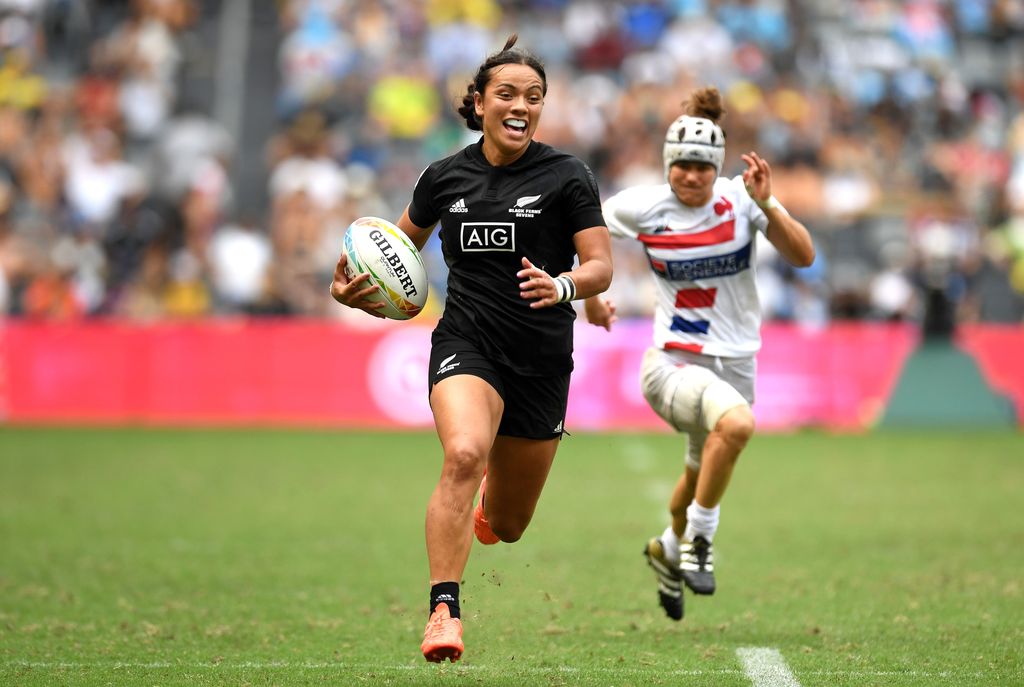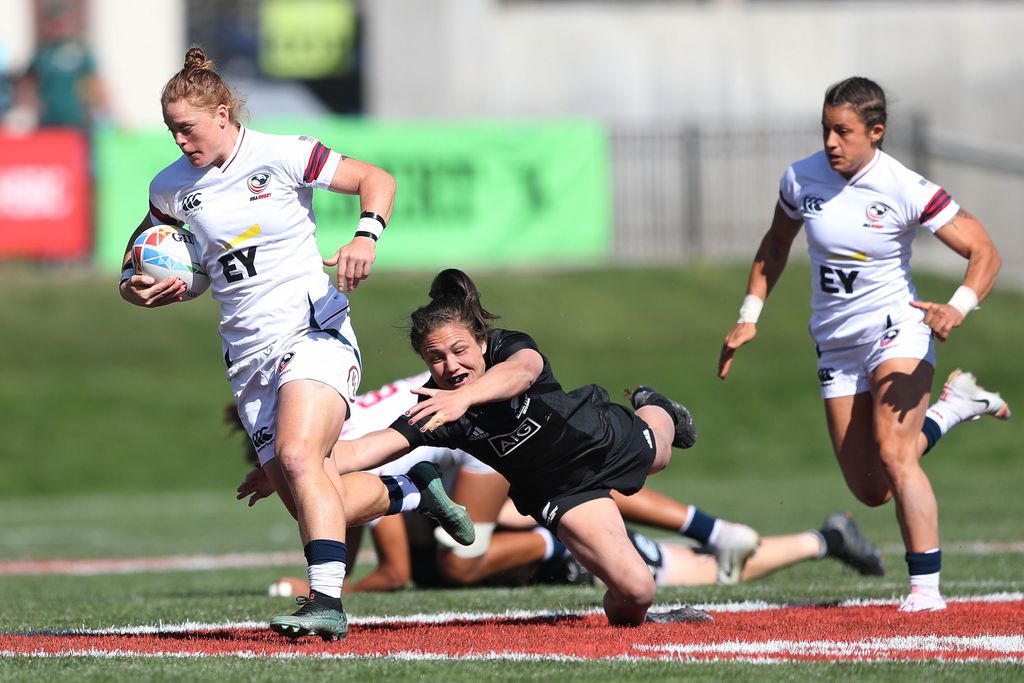On 23 July, 2021 the curtain will come up on the Tokyo Olympic Games, and following an enthralling debut in Rio four years ago, sevens is set to take centre stage.
Rugby World Cup 2019 highlighted the growing popularity of the game in Japan, with a record-breaking cumulative domestic television audience of 425 million and the creation of more than one million new rugby participants through the Impact Beyond programme.
Last week, the schedule for both the men’s and women’s tournaments was confirmed. And with Tokyo Stadium set to provide an iconic setting for rugby once again, sevens tickets are anticipated to be among the most in-demand at the Games.
As the countdown to the rescheduled Tokyo 2020 begins in earnest, and with 21 of 24 competing nations confirmed, we take a look at the frontrunners, the most-improved teams and those set to make their Games debut.
SEE DETAILS ON TOKYO 2020 OLYMPIC QUALIFICATION HERE >>
Frontrunners
Some of the names may have changed but Fiji’s men remain well placed to add to the maiden Olympic medal they won in such stunning style in Rio. No team has won more World Series events than Fiji (12) in the intervening four years. Although they were third in the standings when the COVID-19 pandemic brought an end to the 2020 season, Sevuloni Mocenacagi produced arguably the standout moment of the campaign with an outrageous scoring pass for Jerry Tuwai in Los Angeles.
New Zealand topped the abbreviated standings in 2020, winning their first World Series title since 2014. Veteran forward Tim Mikkelson continues to lead by example, and was ably supported by the likes of Regan Ware, Andrew Knewstubb and Caleb Clarke as the All Blacks Sevens won in Cape Town, Hamilton and Vancouver.
South Africa, second in 2020, will also fancy their chances in Tokyo having won World Series titles in 2016/17 and 2018. This season, the Blitzboks won in Dubai and LA, where captain Stedman Gans excelled.

Australia’s recruitment drive for female sevens players in the early part of the 2010s was rewarded with gold in Rio. And the squad that defeated New Zealand at Deodoro Stadium is still making an impact on the World Series. Ellia Green, Sharni Williams and Emma Tonegato all ranked in the top 10 for points scored, while the latter and Alicia Lucas were among the most prolific tacklers. Australia have reached 11 World Series Cup finals since Rio, but — largely due to New Zealand — only won two of those, and have not lifted a Cup title since February 2018.
The Black Ferns Sevens have undoubtedly been the form team on the World Series since sevens’ Olympic debut. New Zealand have won 16 Cup titles out of a possible 22, with Stacey Fluhler, Tyla Nathan-Wong and Kelly Brazier among the team’s top performers. Portia Woodman, meanwhile, is set to make her comeback from injury in this year’s Farah Palmer Cup and with the emergence of Jazmin Hotham, the future looks rosy.
Canada reached three Cup finals during the 2020 Series, and a squad that contains a good mix of youth and experience had been confident of securing a podium place in Tokyo before the Games were postponed.
Most improved
Prior to Rio 2016, USA’s men had never finished higher than sixth on the World Series. That changed in 2017, when they came fifth and a period of steady improvement culminated in a title challenge in 2019. Wingers Carlin Isles and Perry Baker both passed the 200-try mark during 2020.
Another men’s team on the rise in recent seasons, albeit one that is yet to book their place in Tokyo, has been France. Les Bleus, who will compete in the Olympic Games Repechage, reached a World Series final for the first time in six years at the HSBC Canada Sevens 2019, and repeated the feat in Hong Kong. In 2020, they came third in Cape Town and — powered by the tries of Tavite Veredamu — were losing finalists in Hamilton.

Only four teams have tasted women’s Cup final success on the World Series since the curtain came down on the action at Deodoro Stadium. In that time, the USA — who finished fifth in Rio — have won as many titles (two) as Australia and Canada. Alev Kelter topped the 2020 Series point-scoring chart, following a season that started with victory in the team’s home event in Glendale.
Fiji, who were beaten by the USA in the fifth-place semi-final at Rio 2016, notched their best World Series finish in 2016/17, when the team came fourth behind New Zealand, Australia and Canada. Fijiana endured a couple of lean years following that, but were back putting pressure on the Cup contenders in 2020, when they ended the truncated campaign seventh. Only four players made more clean breaks than Ana Maria Naimasi in 2020.
Newcomers
Canada and Korea will both make their debut in the men’s tournament at Tokyo 2020. The Canadians have been ever-present on the World Series since Rio 2016, and the team won its maiden title at the HSBC Singapore Sevens in 2017. In the most recent event on the World Series, the HSBC Canada Sevens 2020, Nathan Hirayama scored 43 points as the hosts secured a third-place finish.
Korea, meanwhile, booked their spot in Tokyo with a nerve-shredding defeat of Hong Kong at the Asia Rugby Olympic qualifier. The Koreans have appeared at three World Series events since Rio 2016, taking vital lessons from each tournament. Last month, Andre Jin picked out Chang Yongheung and Jang Jeongmin as players to watch next summer.
Of the 10 women’s teams to have confirmed their place at Tokyo 2020, China are the only debutants. Coached by Sean Horan, who led New Zealand to a silver medal in Rio, China booked their ticket with a win over Hong Kong on home soil. The Chinese were a core team on the 2019 Series, and secured a best-ever finish of seventh at the HSBC France Women’s Sevens last June.
The identity of the final two nations will be decided at the Olympic Games Repechage, where 10 potential debutants — Argentina, Mexico, Jamaica, Russia, Madagascar, Tunisia, Papua New Guinea, Samoa, Hong Kong and Kazakhstan — will compete against Colombia and France.
READ MORE: Rugby gold: Australia edge New Zealand to Olympic title in Rio >>





